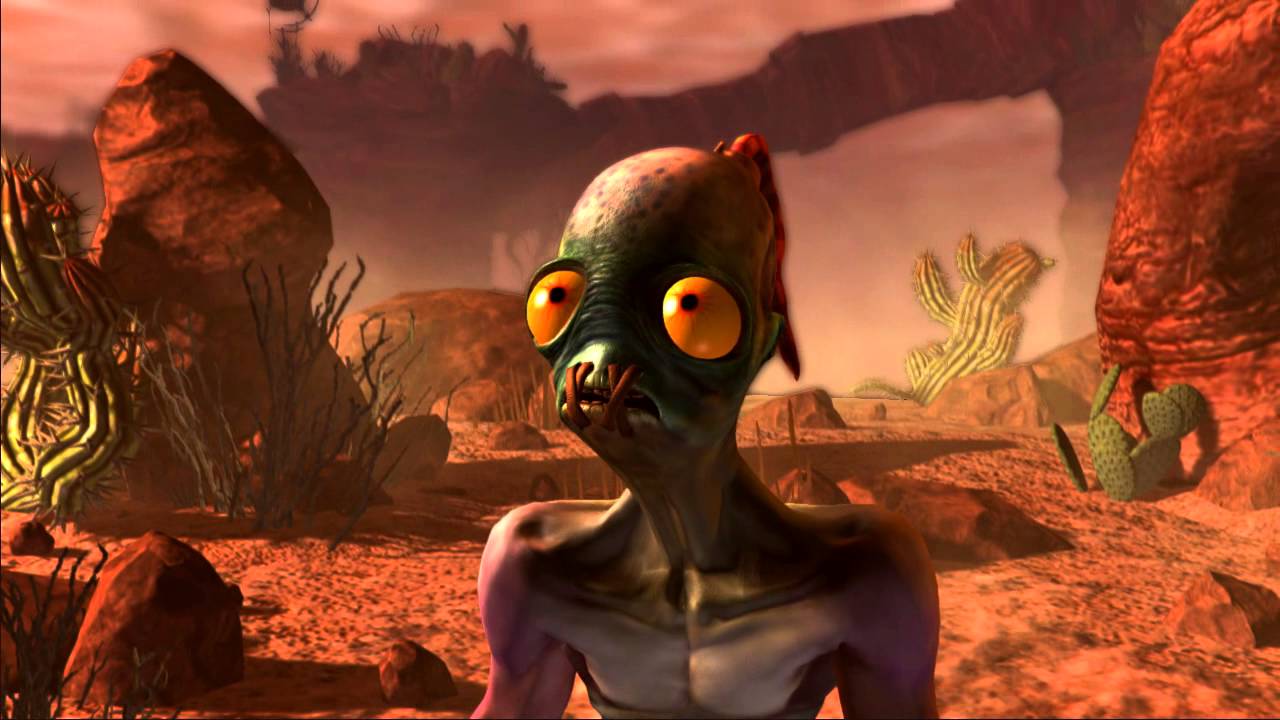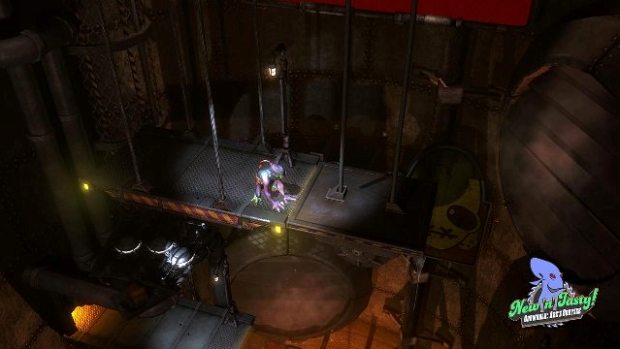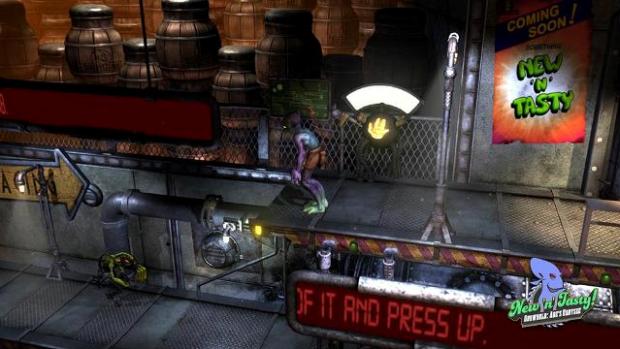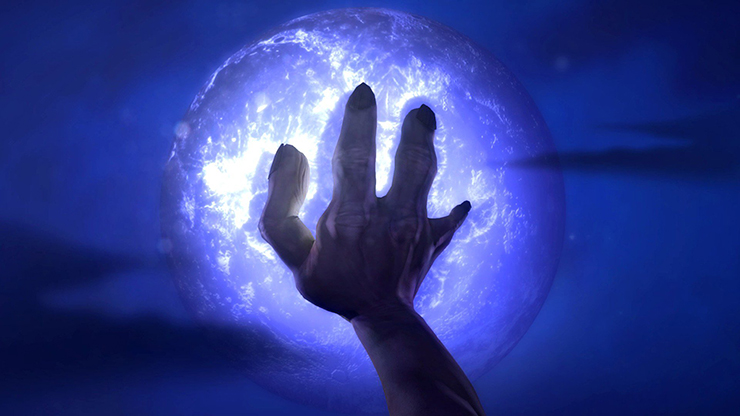It’s an Odd, Odd World: An Interview with Lorne Lanning
Lorne Lanning co-founded Oddworld Inhabitants along with Sherry McKenna in 1994 and over the next ten years saw firsthand how publishers exploited independent game studios, locking them into unfair contracts that benefited the publishers while leading many studios to the brink of bankruptcy. After the botched launch of 2005’s Oddworld: Stranger’s Wrath, thanks to poor marketing and support by publisher Electronic Arts, Oddworld Inhabitants receded into the shadows of the gaming industry, reducing its staff to a handful of people and sitting on one of the most interesting and rich intellectual properties in gaming history. After Stranger’s Wrath, Lanning saw the writing on the wall and decided to wait until the industry changed.
And change it did.
Today indie developers have the power to fund, develop, and distribute video games without the need for a publishing partner. Instead of begging at the feet of publishers, publishers now openly court promising indie studios. While major publishers will always have influence over the industry, the balance of power has nevertheless shifted slightly. Owing to this shift in the industry, Oddworld Inhabitants realized the time was right to invest in development once again.
To reintroduce their major IP, Oddworld Inhabitants partnered with UK developer Just Add Water (JAW) to release the Oddbox, a collection of all four Oddworld games on the PC, and remaster the ill-fated but brilliant Stranger’s Wrath, which released in December 2012. Following the success of these two ventures, JAW has since remastered the flawed but charming Munch’s Oddysee and more recently rebuilt the indomitable original Abe’s Oddysee from the ground up in a new 3D engine under the title of New ‘n Tasty, available now on all leading platforms, with a Wii U version in the pipeline.
As somebody who has seen the industry transform over the last twenty years, Oddworld co-founder and creative genius Lorne Lanning has a lot to say about changes in the industry, and I was fortunate enough to sit down with him for a chat at E3 2015. During our brief conversation, Lanning touches on capitalism, changes in the gaming industry, unexplored Oddworld lore, and, of course, bread storage.

You’ve had a lot to say about capitalism and the games industry throughout your career. My question to you is: can games survive capitalism? Or put another, more provocative way, can games survive without capitalism?
“Well, thinking about anything without capitalism is a fuzzy space that is yet to be explored. The context of the conversation likes to be framed as you can have socialism or communism. That’s like saying: do you like coke or pepsi? And I’m like, I don’t drink sugared water shit, okay? Communism. Capitalism. Socialism. If those are the three options, we’re having a dumb discussion. There are way greater possibilities that people far smarter than I have outlined for how that could work.
Now the problem inherently with capitalism is its based on growth. And the only other things that we know that are based on growth are rats and cockroaches. They have no fucking assimilation to the natural balance of things. Just take it all. They will take it all until there’s nothing left. And then they die off themselves. That’s the condition we’re in right now.
You talk to the world’s smartest marine biologists that don’t work for corporations, and they will tell you: we are in deep shit. Certain things can happen and then we’re at a tipping point. Now, maybe we can figure out a solution, which is usually our delusional path. Oh, we’ll just figure it all out later, but let’s reap all the rewards now. There are much better alternatives than the three options that we’ve been told we have as a possibility.
The big problem is capitalism is inevitably about monopolies. And then we say, no, no, no: duopolies are fine. But then you find out that the same shareholders own them all. So what we have is a power structure that eventually oppresses, dominates, exploits – trickle down is a lie – and wins through monopolies. It’s all about growth. It’s not about sustainability. We have to learn to grow up with sustainability. Anyway, that’s my capitalism rant.”

“There’s a great book that’s called Nudge, and it’s about business in the 21st century and how internet businesses work. If you think about back in the day, companies like Microsoft would come in and provide tools for people. But it wasn’t like their platform was a platform for people to build businesses upon. EBay comes along and starts changing all that. You want a store? You’re a girl who likes collecting used shoes? You know your audience? Sell them here. The difference is like Sotheby’s versus eBay. Sotheby’s would say, “We’ll decide if you can be part of our offering or not, because we are the premier brand. So we’ll be the filter and decide whether you’re good enough to be here or not.” EBay said, “You got an audience and something to sell? Sell it here. If it’s a $10 million diamond, if it’s a $50 million house, if it’s a $3 dirty sock. If you got your audience, you can sell it here.” Now who is worth more money today? You would much rather own eBay than Sotheby’s. That’s the new model.
EBay provided a basis by which it democratized the possibility for people to use a platform and find an audience. Youtube did this. Machinima did this. Facebook did this, too. Zynga wouldn’t have happened without a Facebook to say, “Build your business here.” Now they find out if you’re taking too much money, they turn the dials on you and start cutting you off, and then you’re in trouble because your growth is a problem. And gee, what are we witnessing now?
But the democratization of the creator meeting the audience is something that I don’t attribute to capitalism. I attribute it to technological evolution. When we look at all the power and money and talent that is here at E3, it’s really sad that in the world we live in, if it’s not profitable, it’s not going to get funded. Where’s us teaching the elementary school kid physics and seven languages by the time he or she get out of fifth grade? We can do this with those game machines, no problem, but there’s no support because it has to be about making money. That’s how fucked up we are. Any species that you run a simulation on with those decisions is not going to last very long.

So, what I think happened was, this [lifts his iPhone] was the real democratization, this is what changed games. Apple said, “Why don’t we let the users get a SDK for free.” It used to be $20,000 if you wanted to buy a SDK for one of the big consoles. And then you needed 20 of them. So you were either a business or you didn’t get to play. So the iPhone comes out and says, “It’s a free SDK, download it now, free store to put your shit up, and if you can sell it, great.” So a guy figures out a whoopee cushion app in a day and he makes a $1 billion. You remember this story? All of a sudden, the platform had a creator to audience connection with no one in between. The closest we had to that before was Steam, in my estimation, so what that did is it led to a huge influx of games in the mobile space. Angry Birds. Billion dollar gaming companies coming out of nowhere. The world had to pay attention to that.
Now the guys who didn’t have the ability to get ten dev stations before can make a business. What that did is it caused a whole migration of talent into a space where they could reach an audience on their own. How many game developers do you know that were working in the triple-A console space that suddenly went, “We’re starting an apps company.” The reason they did that was it was an access point that they basically didn’t have before. In turn, that migration and success were pointing toward some real trends.
Now, this is where Sony gets an enormous amount of credit. It’s arguable to what degree anybody won the last console war. If you really measure how many boxes are in the market versus how many were returned. We had a failure rate on some systems of how high? Forty-five percent? So the real numbers there are fuzzy. So, now you come into this generation at E3 2013, and what we saw was Sony somehow understood that the future was more of an iPhone-ish model than it was an old world model of the way consoles used to be.”

Opening the floodgates, letting people come in and create and then access the audience.
“But what were they doing? They were seeing what the audience already wanted. They were watching the patterns of what the audience was already doing. Other console manufacturers were seeing their history of trying to keep monopolies. They speak really good Wall Street but they speak terribly to the audience. And they are listening to Wall Street but they aren’t listening to the audience. Well, Wall Street is becoming less important in the process when you consider Minecraft can earn millions of dollars without them.
I was able to criticize the Xbox One policies in 2013 very confidently and predict, not because I’m psychic but because it’s obvious, that those policies would have to change or they would lose the battle. If you understand how the trends are going with the audience and with the entrepreneurs, you go, well, that’s the old world. That’s a 20th century model. No one has any real interest in supporting it, because it’s not going to lead to greater diversity. It’s bad for the audience. It’s bad for the console company, and it’s bad for the developers trying to participate. Whereas Sony went, “Come on in. If you’re decent, we want to help you. We’ll have a filter for quality, but here, go publish.” Nintendo followed suit. ”
And Microsoft is also changing its tune.
“What they did was they made the right decisions. They got the right guy running it. They got the right guy in the indie space: Chris Charla. He’s a proven developer that understands what developers want. Now, he is working in the beast that is Microsoft. And it’s hard to move that enormous boat that is the corporation. But imagine if none of the console guys changed their old policies. Where would we be here at E3 2015? ”

It’s hard to imagine because we’ve seen so many huge transformations over the last 10 years.
“Exactly. So it democratized development and brought creators to the audience.”
So let’s shift our conversation to Oddworld itself. I’ve been a fan since the original game in 1997. But rather than talk about the games, because I think they speak for themselves, I want to talk about some lore. What’s one part of Oddworld that players have never seen but you have fully realized in your head?
“I’ll give you one. It’s the world of Fangus Klot. We had started the Brutal Ballod of Fangus Klot and that’s about the time we just ultimately didn’t like where the industry was going. So we bet on the audience rather than the publishers. We bet on digital distribution rather than retailers. We had to wait. We had to be patient, but this is the way we thought we would survive. Because of that, I didn’t get to realize that title, but it still sits there.
In that title, I wanted to play off of myths that lie deep in our history of civilization, one of those dynamic, eternal battles, like good versus evil, which forms the basis for Star Wars and Lord of the Rings. We also have eternal wars, like War of the Roses, male and female, and there’s also dog and cat. What I want to do is go to this other continent and here’s the history of this continent, and Fangus is going to be this character who – and I’m not saying we’re building this, okay? – but Fangus is to be this character who is really Man on Fire meets Old Yeller. So we have a guy who has a limited time to really make a difference, and he has been through it all and seen it all. He’s a hard dude. And if we trace his DNA back, he’s close to something like canine DNA.
And now he’s in a landscape where, imagine if Eastern European drug traffickers are able to become the government through the type of bullshit where, in the past the U.S. has gone, “Oh, we have to go invade this country and help these people.” The bullshit propaganda that inspires me to make content and that is saturated throughout the world we live in. But in this game, an invader makes this bullshit propaganda and then basically turns a beautiful landscape into meth labs. And the invaders have the traces of feline DNA. So imagine Eastern European thugs and criminals who are more like felines in origin. We’ll play off of that dog versus cat theme and realize it in a way that is more subtle, but we’ll emphasize the eternal war aspects of it.

Ultimately, it’s really about the story of a shepherd who winds up in bad circumstances – bad shit goes down – during this invasion. He winds up like a Gladiator type. If you remember that movie, you have a guy who is a hero who winds up as a slave. Fangus Klot was realized to a deep degree and that part of the world is something I want to explore someday. But that’s a sub-$10 million property to hit the street running with. And it’s a new IP. Not so smart as an indie right now. We don’t have the muscle right now. So I don’t know when that will happen.
We also had Hand of Odd. We spent a lot of time on that. Hand of Odd, in a simple way, was based on the idea that, two opposing parties do the same thing to try to beat one another: exploit the environment, turn it into shit, cut everything down, mine everything, build it into weapons, armaments, and defense budgets, and attack another party that is doing the same thing. And when you finally beat them, you have a devastated, apocalyptic landscape and you go, “I won!”
There it is. There’s our model of the world today.
Well, what if we didn’t just have two industrial cultures that were raping the landscape. What if one culture was more indigenous and thrives off the power of plants? They are about regenerating a natural landscape. The other is an industrial culture and is about harvesting a landscape. So we have a push and pull about how you get your power. You’re either chopping down trees in order to get your weapons or you’re growing more in order to channel the vibrant prana power of the forest, and then we’re building defenses that way. We wanted to create this ideological tug of war between sustainable and indigenous cultures who are able to take life and turn that into power and others who process and harvest life and turn that into very mechanical things. That was the idea behind Hand of Odd.

What each of these games do when we conceptually develop them, even if we don’t get into actual development, they strengthen the reservoir of information that provides the background to our world. Then, whatever we’re doing, we go, oh, we have all these points of reference to go on. Those two properties were on two different continents.
We also have the rest of the Quintology. It’s really about Abe’s story, from the beginning of being a lowly third world slave laborer to eventually winding up dead, smack center in a giant Metropolis, in the heart of consumerism. What is going to happen to this lowly slave who goes from the butthole of the world to the center of cosmopolitanism when he notices that these rocks that people were slaving for are now worn on beautiful womens’ rings? That is the path of the Quintology. We haven’t even gotten into the populated places of Abe’s story yet. I have hundreds of paintings that mapped out the movies for this story. We just haven’t put those out there yet. We’ve done lots of work developing landscapes that we haven’t hit yet in any of the games. That gives us our depth. We know what that depth is. The audience hasn’t seen it yet, but when we do deliver, I think the audience will feel it. I think that’s a big reason why we have some of the dedicated fans that we do. They feel the depth there.”
Finally, we always like to end interviews with this soul-searching question: where do you store your ketchup? In the cupboard or the fridge?
I gotta tell you. I was just told to back off on whey and wheat and stuff like that. So I haven’t been eating bread. But okay: when I do, it’s sourdough and I keep it in the freezer. So a loaf lasts me a couple months. Otherwise, it goes bad in a week, right? It’s just me and Sherry. The dogs don’t eat the bread.




